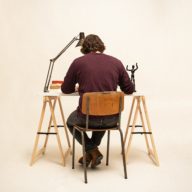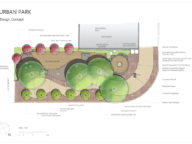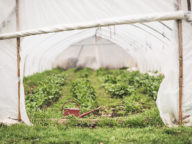[Editor’s Note: When God created the world, he saw that “it was good.” In this series, we want to explore how our faith in Jesus helps us celebrate and enjoy what’s good in creation––but also work as stewards to help it thrive to its fullest potential. Caring for our planet, including plants and animals, fungi and microbes, ecosystems and people, is a high calling from God––a calling in which we can engage out of love and not fear. The gospel gives us hope that what is broken can be restored, and even now, we can enjoy what has been given to us. Join us as we #celebratecreation.
We interviewed Alicia Wilson, the founder and director of Restoration Project. She also recently helped launch In My Backyard, an organization tackling the housing crisis in southern Ontario. Alicia loves living in community: her “household” is made of 16 people who eat, pray, and live together in Hamilton, ON.]
P2C-Students: Briefly, what is Restoration Project?
Alicia Wilson: Restoration Project is a nonprofit in Hamilton, ON. We teach woodworking skills to adults with developmental disabilities. Our goal is to allow them to use reclaimed materials to create products that they can then sell to generate an income for themselves.
P2C-S: What motivates you to work with adults with developmental disabilities?
Alicia: I started working in group homes when I was 19, supporting people with disabilities. And during that time, I started to recognize that, often, the programming that we were giving wasn’t providing purposeful work or activities. And so I started to develop a passion for seeing people with developmental disabilities really live into who God created them to be and what their passions were.
Coming out of the group homes, I wanted to start something that was different. For many people who have developmental disabilities, most of their relationships are based on the paid positions of those supporting them. It’s hard to create genuine relationships when you know that someone is there as a job. So a lot of Restoration Project was also building into that relational aspect: How do we encourage those authentic relationships? And so really focusing on a volunteer base and a youth mentorship program, so that there’s ideally always both a youth and a volunteer working alongside our artisans (who all have disabilities).
P2C-S: I confess I don’t know much about the lives of those with developmental disabilities. Do they often have work of some kind? Or do they normally have no work?
Alicia: Yeah, the stats are very, very high towards unemployment. And often, if they are able to get work, they need support. And so we’ve tried to create a program that provides that support for them, but not in a paid supported way.
We’re still working on a model of being able to generate a sustainable income. In the startup days, a lot of people volunteered—like even those with developmental disabilities—and the funds went towards running Restoration Project. And then we were able to start switching to a paid model: every quarter we would give an honorarium cheque. The model that we’re aiming for is that the artisans will actually get a commission off every piece that they make.
If we were to create a salaried, hourly wage, then I would really have to push, like We can only afford to have you here if you produce X amount. I wanted to move away from This is what has to be produced for you to be profitable for us.
Using the language of independent artisans, it means that if one of my artisans comes in and he’s having a bad day, and he doesn’t want to work, he doesn’t have to, and we don’t lose anything. It just allows everyone to work at their own pace and their own ability. And then, our hope is that with the volunteers coming alongside of them, we’re able to still offer a competitive wage.
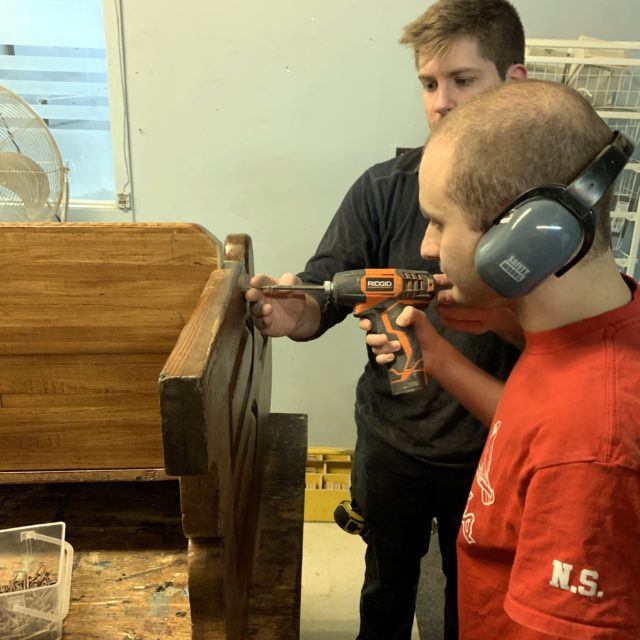
P2C-S: What I see in all this is a strong desire to honour the people you work with as individuals. I hear you calling them independent artisans; I hear you wanting to pay them fairly; and I hear you honouring their limitations. You don’t want to treat anyone as a machine!
Alicia: Yeah, we really wanted to get away from the model of them needing to conform to our expectations of what an artisan or woodworker would look like. Because I think, so often, we expect people with disabilities to modify their behaviour to fit into society. And it just doesn’t work for them. Often just getting through the day is already a challenge, without adding You have to get through your day in this exact way.
So we really worked with Restoration Project to try and make it so that we modify how we do woodworking to fit their needs. And so if we have someone in a wheelchair, then we just lower the tables and the saws. No one is exempt just because the tools don’t work for them. Or if they’re not as confident on one of the tools, then we do a “hand-over-hand” model, where the volunteer is actually physically putting their hand on the artisan’s hand and showing them the motions. And then eventually they’ll learn those motions. But we try to modify how we do our skills training specifically to their needs.
And again, if one of them needs some time, and they’re just too worked up or stressed out or having a meltdown, then it’s not like, You can’t come back. It’s Just go take your time. We really try to honour and recognize that they all have different needs and different passions and different pursuits. And so there’s no This is how it has to be. It’s very much trying to figure out How do we bring them in with their specific needs?
P2C-S: Because each person is different, how do you see them offering something uniquely creative? I assume that as they gain skills, they create in ways that I might not think of. Do you see that?
Alicia: Yes, definitely. I would say, at the beginning, there’s always a hesitancy, because they often haven’t had opportunities of this kind. And then slowly as we’re making cutting boards, they’re like, Hey, we could cut this shape into it, or they’ll see materials and say, Hey, we can make this out of this. And so at the beginning, I would offer a lot of direction. And I’ve found that the more the artisans take our workshops, and the more they’re around the shop, the more often they’re actually bringing me pictures of stuff they designed.
I remember one guy after his first two or three workshops—where he built something that we had designed—he wanted to make a table tray for his car, because he liked to eat in the car but he hated the mess. And so he had measured the width of his seat and what it looked like and how it would sit on his lap, and came with all the drawings. He says, I want to make this. And so it was a lot of fun to be like, Okay, then we’ll make that because it’s what you came up with. And it may not be something that we can sell, but it’s something that he was passionate about making. And so that’s fine, right? There’s room.
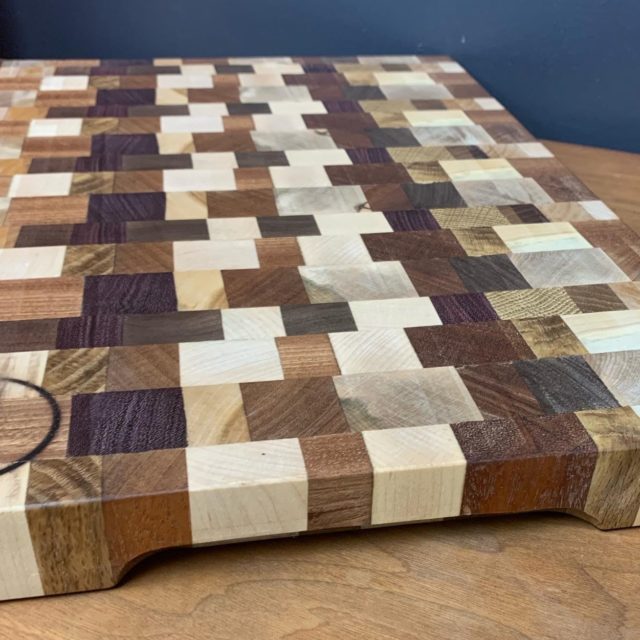
P2C-S: It sounds like the focus is ultimately on the people and not the products.
Alicia: Yeah, yeah, though we do have some products. And when we get custom orders, then it’s kind of like, Hey, guys, somebody ordered this, we’re gonna try to make it for them. And then they’re usually really excited about making something that they know is going into someone’s home.
P2C-S: That does seem really meaningful. I mean, so many jobs are menial, even for able-bodied people. I think being able to offer creative work in general is an important part of being human.
Alicia: And for me, a big thing is this idea of “dignity of risk.” So many of our guys haven’t been given the opportunity to take the risk of using a power tool. Like people just said, Oh, that’s just too dangerous for you, or You’re not capable of doing this. And so I think for them to be entrusted with the ability to take that risk, and also do those things that you or I would—I think it’s really meaningful for them.
I really want people to be surprised that our products were built by somebody with a disability, because I want to show that their skills are just as good as anyone else’s. The process of getting to that end product might look a little different—it may not be quite as fast and it may not be quite as efficient. But in the end, we still have products that are beautiful and that people are proud to own in their house, and not just like, Oh, I bought this just because I thought I should support a good cause.
P2C-S: If the work is not as fast and efficient, how do you feel about giving up time and energy to help others create? In theory, you could be creating yourself. How hard is it to make this kind of sacrifice? Is it on your mind as you serve, and if so, what helps you continue to serve others?
Alicia: Not for me, because the excitement is in seeing the artisans do it. And also, when I started Restoration Project, I had no woodworking skills. I started a woodworking nonprofit with no woodworking skills! So I had to learn alongside them. And I still get a chance to be creative in that process.
And the same with our volunteers; I think they really enjoy being a part of the products, even if they’re not taking the lead. And maybe that’s part of the beauty of it: rather than the focus being on me, or the volunteers’ focus on being on themselves, they get to step outside and say, Oh, I’m actually here just for this person. And there’s this kind of beautiful mutuality that seems to come out of that. And so they may not be able to express their creativity or their own woodworking skills in those moments, but I think they’re learning as people, and they’re seeing how to connect with somebody that they may not have had the opportunity to connect with before.
And they’re growing in those friendships. Which is really neat, I think, to see just how passionate our volunteers get from helping. And even in the breaks during COVID, many of my volunteers have texted me and said, I can’t believe how much I miss being in the shop and how much I miss being with the guys. I never would have thought that it would be so meaningful to me.
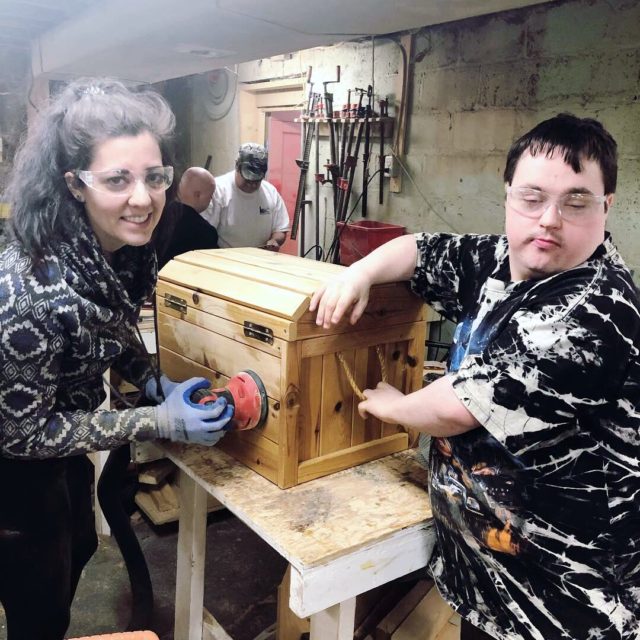
P2C-S: Yeah, even if someone doesn’t mean to, I’m sure it’s easy to walk in with bias or prejudice—but then to be surprised by the relationships.
Alicia: Yeah for sure. I think there’s a lot of bias like, I’m coming in, and they’re going to benefit from me. And then volunteers start to realize, Oh, I’m actually benefiting as well. And maybe even more so in some cases, from the relationship and the personal growth, and just getting to know someone that you wouldn’t necessarily encounter in your day-to-day life.
P2C-S: You’ve described some benefits, but I’m wondering specifically, how has working with people with developmental disabilities changed the way you’ve seen yourself and your own abilities?
Alicia: In general—but especially when I was in my 20s—I’ve functioned out of a productivity mode, where productivity is equated to value.
In the very early days working at group homes, I remember having this specific moment. I was supporting an individual who was a quadriplegic. And in a day, he couldn’t really accomplish anything. But I remember having this realization that God loved and valued him, just as much as he valued and loved me. And that was true for everyone I supported. And it really changed my mentality. I had this big expectation on myself: I have to do some kind of great thing for God. And realizing that, Oh, no, he actually values and loves me, just as I am. And I think that realization was really important for me to learn. Learning really what my identity is, and that it isn’t what I do, or what I produce, or what degrees I get.
I think the other thing—there’s so many things I’ve learned—but definitely, being able to slow down. And being able to just be in the moment. I think often, I’d be looking for what’s next. And with Restoration Project, I think that ability to slow down and to be with our artisans in the moment of making something—you have to be paying attention, because you’re responsible for their safety. And so to just slow down and not rush things. Because often in my rushing, I would create anxiety for those I was supporting. It’s easy to get frustrated with them for their anxiety, and what comes of that, whether it’s an outburst, or a meltdown, or just freezing. And then having to come back and realize, Oh, I was actually the source of their anxiety. And so having to own that, I need to slow down and just be present.
Thirdly, just how much communication can happen without verbal communication! A lot of the people that I supported early on were nonverbal. And I think that’s actually shaped a lot of how I interact with people in general: that conversations are important, and a lot is said, but you can actually communicate so much more to people through the nonverbal sides of things and the way that we treat people. The way that we value people actually comes more out of what we do than what we say.
P2C-S: You’ve touched on it already, but can you say more about how people with developmental disabilities have affected your understanding of God?
Alicia: They’ve shaped my understanding of God’s desire to interact with us and to simply be present with us. Again, it comes back to patience versus rushing. So rather than like What I can bring to God? I’ve learned to be in God’s presence, and to recognize God working in those small moments.
I think working with people with disabilities has helped me understand God as the suffering God and the God who suffers with us. Because it’s hard sometimes to make sense of the struggles that a lot of people with disabilities go through. But then I also see the joy that they find, and I’ve come to recognize that the presence of suffering doesn’t mean that there’s a lack of joy.
They’ve challenged my understanding of what perfection is and what it means to be human. And in shaping my understanding of what it means to be human, to be vulnerable, and to be someone who is able to suffer but still embrace joy, they’ve shaped my understanding of who God is.
P2C-S: What are some things that the average able-bodied person can do to help celebrate those who have different abilities?
Alicia: I think one of the biggest things is to be able to recognize and not overlook their gifts and their purpose, and the things they have to offer. I think that mutuality in relationships is super important. And so I think not approaching those relationships as top-down, like, Oh, I’m here to just offer them something. But actually recognizing that they have something to offer me and that God has something to offer me through them. And it’s that kind of mutuality, where we’re all called to be in community with one another. Not because I have so much more to offer than they do, but that there’s actually a two-way street, where we each mutually benefit.
And I think, just recognizing that we are all created in the image of God. Seeing God in every person expands our understanding of who God is. I think we get so caught up with the disability that we miss the things that they have that are lacking in us: patience and joy and happiness and the ability to persevere. I see these so much more in my artisans than I often do in others.
"*" indicates required fields

